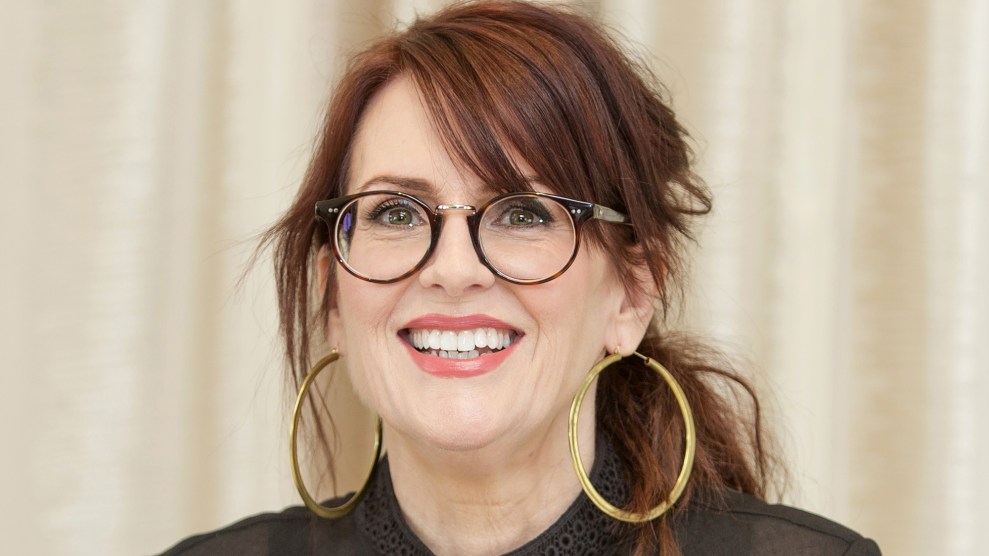
Amanda Gallo/ZUMA
Megan Mullally was having a rough day. She was headed to her high school reunion, she had just finished shooting the eighth episode of the Will and Grace revival, and parking her car was a nightmare—but what else do you expect in Los Angeles? When she finally reached her destination, where we were supposed to talk, it was loud. “If anybody says, ‘Hey I’m gonna talk to you from the lobby of the entryway to Sally Hershberger Salon,’ say no,” she advised me—letting her famous dry wit come through, despite her frustrations.
But we talked anyway, and she was kind enough to even laugh at my jokes and make her own. What she really wanted to discuss, though, and what she wants everyone to know, is this: She’s not just Karen Walker, the delightfully inappropriate, self-absorbed socialite who is the perfect comic foil to her earnest boss, Grace Adler, on Will and Grace. She’s also a musician. And she has a lot to sing about.
As one of two front women, along with Stephanie Hunt, in a “punk showbiz” band called Nancy And Beth, Mullally is using music to explore issues of gender and relationships, all with that sense of humor. Hipster 2.0 with a Snapchat aesthetic, the band released its first album this spring and has covered songs ranging from Wynona Carr’s bluesy “Please, Mr. Jailer” to Gucci Mane’s raunchy “I Don’t Love Her.” “It was just instantaneous, head-snapping, eyes wide and mouths agape,” Mullally told the Los Angeles Times in April about “I Don’t Love Her.” “It’s the furthest thing from a feminist anthem you could even unearth, but the mere fact of the two of us doing it makes you think.” (Just one sample lyric: “I love the way she fuck me (but I don’t love her)/ I love the way she suck me (still I don’t love her).”)
Mullally recently caught up with Mother Jones and talked about the sneaky feminism of Nancy And Beth, how landing her first big gig when she was almost 40 might have helped her get equal pay, and why it’s hard to turn down Donald Trump in overalls.
Mother Jones: So you and Stephanie decided to cover “I Don’t Love Her.” What drew you to that song?
Megan Mullally: Well, I was actually searching for a different song that had “Gucci” in the title. I know Gucci Mane is a very popular recording artist, but I wasn’t familiar with him at the time. I saw this track that was called “I Don’t Love Her,” and I thought, “That’s an interesting name for a song.” I played it and I thought, “Oh no!” And at the same time, I was thinking, “Oh, yes.” So I played it for Stephanie, and we printed out the lyrics, and we sang it, and that was it.
I always call it a feminist anthem and joke that we think it was written by Gloria Steinem. Just the fact that Stephanie and I do that song is a feminist statement—[our performance] makes you stop and think about where we’re at as a culture. If you hear the Gucci Mane version, that’s one thing. But if you hear it performed by a 28-year-old and a 58-year-old woman, it makes you sit up and take notice.
[In the song], she’s just not good enough for him, no matter what she does. In our version, we say a lot of funny stuff in the background of the song about how she’s not enough of a feminist for him, even though she’s really good in bed, but that’s just not gonna cut it for this guy. We made that an issue—rather than it just being like, “He’s particular about his women,” we turned it into, “He’s particular about their feminist politics.“ Which, of course, is not anywhere in Gucci Mane’s version.
MJ: Have you always considered yourself a feminist?
MM: I grew up in Oklahoma City a long time ago, so you can add that into your math, and read into it what you will. I guess it was a bit of a learning curve.
MJ: I totally understand—I grew up in rural Tennessee, so you’re in good company.
MM: Oh, that’s great! I love that.
MJ: How’d you know that you could be in a band with Stephanie [Hunt]? It seems like a really important relationship.
MM: So we have a 30-year age difference. I think she was 22 when we first met. She just recently turned 28. We were working together on a movie in Austin, where she’s from, and she offered to show me around town. I’d never really spent any time in Austin, and we just almost immediately clicked. She mentioned to me that she writes songs and plays the ukulele, and I said, “Oh, I wanna hear!” The first time we sat down, she was gonna play something for me, and she said, “Well there’s one part that you have to sing with me.” She taught it to me, and then the minute we heard our voices together, we just stopped and stared at each other.
MJ: I also found the album cover really striking. Can I ask you about the decision to pose nude for it?
MM: Let me just start by saying that I don’t think that Nick Offerman [Mullally’s husband and actor of Parks and Recreation fame] has ever seen me naked. It’s not my usual. It’s not the first thing that springs to mind—”Hey, let me just take all my clothes off.”
It’s meant to be a commentary on friendship, really. It’s about how time and a sense of aging doesn’t really have to inform anything in your life, in particular, your relationships with other people, or your place in the world, and how people see you, or what people think of you, or what kind of box people want to put you in.
We were careful to desexualize it, to make the photo very neutral. It isn’t meant to be serious or sexual, and it’s interesting how little attention it got. I posted it on social media and it got like four likes. [Editor’s note: It actually got more than 2,000 likes on Instagram.] You know what I’m saying? Nobody was like, “Megan Mullally’s naked!”
MJ: When you first signed on to do Will and Grace in the ’90s, did it feel like you were about to be part of something so culturally significant?
MM: No, we weren’t prescient enough to understand it might have had that kind of impact on the culture. I don’t want to speak for everybody, but I kind of feel like we were all just happy to have a job. Then, as time went on over the eight seasons, we started getting letters from people saying, “You helped me to come out to my parents,” or, “The show helped me come out to my parents, and if it hadn’t I might have killed myself.” I think we all had a great sense of gratitude for anything that the show might have helped to accomplish in terms of breaking down any barriers of people’s intolerance or awareness.
MJ: Have you felt challenged by the revival? Or has it been sort of comfortable, like slipping into a second skin?
MM: The weirdest part about the whole thing is that it doesn’t feel weird, and yet at the same time, I feel like a miracle has occurred. We only shot our eighth episode last night, and I feel like we’re already starting to kind of forget that we ever were gone. A lot of that is facilitated by the fact that we have almost all the same people—the same crew, the same costume designer, same set designer, same lighting designer, same camera guys, same hair and makeup people. It’s the best.
MJ: It’s been such a tough couple of weeks, and I just wondered if you had heard about Harvey Weinstein’s behavior before?
MM: Oh, I have not. My husband says that he had heard a couple of things way back in the day of the Gwyneth Paltrow era [during which time, Paltrow alleges, Weinstein sexually harassed her], which was, I think, before he and I were a couple.
MJ: Have you personally experienced sexual harassment in entertainment?
MM: I have. It’s not something that I want to go into right now, but I have. As have so many of us.
MJ: Do you feel like the discussions happening right now, like the #MeToo campaign, are productive?
MM: I’m overwhelmed by the way in which people suddenly seem to be taking it seriously after all these years, after all these scandals involving all these other powerful men. You have to stop and wonder if people are taking this seriously, finally, because it’s famous people who are saying that it happened to them. And you think, “Oh, well certainly these famous people wouldn’t be gilding the lily; I guess we better sit up and take notice.” It’s discouraging because it should be taken quite seriously no matter who’s saying it, under what circumstances, or about whom they’re saying it. It’s great that this is getting a ton of attention, but there’s sexual harassment and sexual abuse everywhere—it’s pervasive. I hope the topic gets broadened outside of what happens on the casting couch.
MJ: What has your experience been like working for equal pay?
MM: I started so late—I was almost 40 when Will and Grace started—so I think it’s been a little different for me. Sean [Hayes] and I made the same amount of money, and then Eric [McCormack] and Debra [Messing] made the same amount of money, so I didn’t really experience a gender thing—it was more like a hierarchy. And now the four of us are all tied together.
I have experienced the boys club though, quite a bit, and I really, really, hate it. Not on Will and Grace; it doesn’t happen there. And I had a great experience working on a movie called Why Him? that John Hamburg directed, where I was treated as a complete equal in all things. But I’ve been in situations where I was excluded from the conversation, not taken seriously. People say that they love you and respect you and think you’re amazing, while at the same time their behavior toward you is patronizing at best and completely dismissive at worst.
MJ: I rewatched your performance of the Green Acres theme song with Donald Trump at the 2006 Emmys. What was it like for you to watch him become president?
https://www.youtube.com/watch?v=AiZqFGLAeAc
MM: Probably the same as what it’s been like for you to watch Donald Trump become president. Because at the time that we did that stupid thing, that was sort of the heyday of The Apprentice and everybody just thought that he was this hilarious guy who was playing a caricature of himself.
MJ: Anything that involves a pitchfork and Donald Trump, how could you turn that down?
MM: You can’t really pass up Donald Trump in a pair of overalls, it’s not possible. I thought, “Well that was dumb and silly, and totally exactly as much fun as I thought it was gonna be,” because it was so completely bizarre. And that’s why I wanted to do it, it was just so weird. And then I didn’t think another thing about it. So when he announced his candidacy, I thought, “Oh, that’s where he is,” and it became not quite as funny as things went along.









